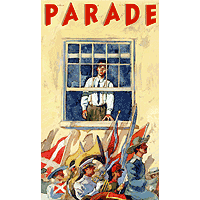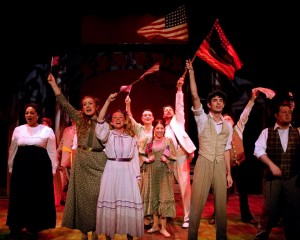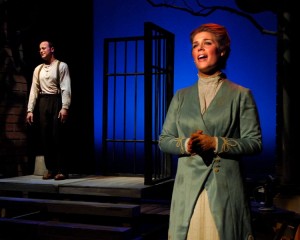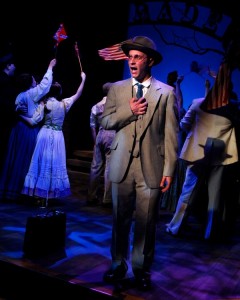Filichia Features: There’s a Parade in the Town of Bloomfield
Filichia Features: There’s a Parade in the Town of Bloomfield
 Just because they didn’t applaud Parade doesn’t mean that they didn’t like it.
Just because they didn’t applaud Parade doesn’t mean that they didn’t like it.
At the opening night performance of the 1998 musical at 4th Wall Theatre in Bloomfield, New Jersey, silence often greeted singers after they’d finished the last note of a Jason Robert Brown song. And yet, when the show came to a close – even before the cast could emerge for curtain calls -- the immediate standing ovation showed that the audience members had indeed appreciated this musical. Their applause then lasted so long that it’s safe to say that many even respected and admired the show.
Then why weren’t they applauding throughout?
It’s a question you might be facing should you care to mount Parade, the extraordinarily ambitious musical that won a Best Score Tony for Brown and a Best Book Tony for Alfred Uhry.
Ah, but the show didn’t win Best Musical, which went to the revue Fosse. Tony voters rarely reward shows that don’t last very long, and Parade managed only 85 performances at the non-profit Lincoln Center Theater. Yes, the run was always scheduled as a limited engagement, but Lincoln Center’s management – like every other management in show business history -- was obviously hoping that public demand would soon make it an unlimited engagement.
Uhry and Brown took a big risk in writing Parade. There aren’t many musicals that deal with the murder of a teenage girl and the man who’s wrongly accused. But that’s what respectively happened to Mary Phagan and Leo Frank in 1913 Atlanta. Worse, Leo was found guilty – a scene that Uhry and Brown chose to end Act One, as most everyone in the courtroom does a Dance of Impending Death.
That certainly caused the 4th Wall audience members to sit in silence. Wouldn’t clapping mean that they were endorsing this injustice? Not until the lights came up to signal intermission did enough time pass for them to regain their bearings and applaud.
Cast of Parade at 4th Wall Theatre sings “The Old Red Hills Of Home” Photo: Tom Schopper
In Act Two, just when a ray of hope peeks through thanks to Mrs. Lucille Frank’s heroic efforts, Leo experiences a far more dire fate than life imprisonment. And yet, Parade succeeds as a galvanic piece of theater that no serious playgoer can afford to miss. As the exemplary production at 4th Wall proves, it’s not at all beyond the reach of the amateur and semi-pro market.
4th Wall plays on a stage about the size of a living room in an upper middle class home. As a result, a show that starts with a parade would not seem to right for such modest environs. But director-choreographer Bob Cline simply has his cast parade in a circular loop. Problem solved.
After that, Parade reduces well. Most of the subsequent scenes take place in small offices and, sad to say, jail cells. Other locations are rooms in Leo and Lucille Frank’s home; Leo’s office; a street corner; a jail cell; the governor’s office; a modest church; a newspaper man’s office; an Atlanta courthouse; a ballroom and an outdoor expanse. As Fay Apple sings in Anyone Can Whistle: easy.
The show begins with a full-of-beans Confederate soldier (Brian Walters) giving a fond farewell to his sweetheart, but still anxious to join the Civil War and show those Yankees a thing or two. Alas, we then see the same soldier 50 years later at the 1913 Confederate Memorial Day Parade. In the original Hal Prince production, he wore a peg-leg. But your troupe, like 4th Wall, can make an analogous statement by having your aged soldier walk with a horrifying limp that suggests that his pants are concealing an artificial leg.
The original production also had an enormous tree over the action. 4th Wall proved you don't need one. Here, when the soldier mentioned carving his initials into it, he just pointed out front. (Guess that's why the company is called 4th Wall ...)
Danny Arnold and Sandy Taylor as Leo and Lucille Frank. Photo: Tom Schopper
Plenty of real-life husbands and wives have performed I Do! I Do! in which both the trivial but real trials of marriage are examined. Here’s a very different and more challenging musical that spouses can do. Hence, at 4th Wall, long-time marrieds Danny Arnold and Sandy Taylor play the Franks. Near show’s end when they kiss, one can see the genuine love that they have for each other. There may also be some joy as a result of knowing they’ve done their jobs exceedingly well.
This kiss comes after Brown’s most clever idea for a song. Leo and Lucille sing “All the Wasted Time” – a title that suggests that they rue his being in prison and their being apart. Brown more wisely decided that the “wasted time” of which they would sing would refer to their years before Leo was arrested. As is the case with so many married couples, they took each other for granted. Now they know what they’ve missed.
This was a number that the first-nighters certainly did applaud – because they were also happy to see that the previously inured-to-each-other couple had now come to appreciate each other.
But earlier, they’d been forced into silence when Mary’s mother (Annie Nelson) testified at the trial. To cope with her intense sorrow, she insisted that “My Child Will Forgive Me” for somehow not preventing the murder. She yearned for the day when they’d be reunited in heaven. The audience increasingly felt her pain and mourned for her.
So, you’re thinking, no surprise that the audience members wouldn’t applaud such a moment. No, it was more than that. The last word of the song had Mrs. Phagan look Leo right in the eye and snarl “Jew!”
Can audience members be expected to applaud this? Anyone who begins clapping runs the risk of having his seatmates assume that he’s endorsing Mrs. Phagan’s hatred and anti-Semitism.
Not every number was denied applause. Jim Conley – Frank’s accuser – got plenty after “That’s What He Said,” a big number that could have almost passed for gospel – if its lyrics hadn’t been indicting an innocent man. As rousing as Uton Onyejekwe’s sang it, he trumped it with a dynamic second-act song, “Feel the Rain Fall.” This one occurred when Conley was doing time on the chain gang, when the Governor came to interrogate him about the crime. Onyejekwe showed plenty of sass and wasn’t the least bit intimidated when dealing with the most important man in the state. He felt no need to be polite or cooperative, for what could the governor do? Send him to a chain gang?
That Conley got applause after each of his numbers comes with an irony: today, he’s assumed to have been the real murderer.
Danny Arnold as Leo Frank. Photo: Tom Schopper
The role of Leo allows a theater to cast as its leading man an actor who doesn’t have conventional leading man looks. At 4th Wall, Arnold beautifully conveys that Leo is a fish out of water (potently signing “How Can I Call This Home?”) who’ll soon be thrust into a fishbowl for all Atlanta to see and hate. He provides the requisite sadness of a man who must see his life ebb away while he can only sit and hope for the best.
Brown, however, did give Leo one totally surprising song. During the trial, three factory workers give testimony that Leo was a sexual predator. As they describe how he came onto them, Leo leaps up in a fantasy sequence and becomes the monster that they describe. He sings a leering, creepy and bass-note-filled “Come Up to My Office.” It’s a harrowing sequence, but Cline didn’t miss the opportunity to make the young girls seem far more interested in Frank than he was in them.
Lucille wants to help, but Leo has his doubts that she can. This leads to the song where Lucille challenges him to “Do It Alone.” Here at 4th Wall, Taylor is giving a very different rendition in the way she chides Leo for thinking that he can manage to get out of jail without her help. Listen to the original cast album, and you’ll hear a furious Carolee Carmello spit out the lyrics in a no-holes barred chastisement of her husband. That’s certainly a valid interpretation, but Taylor and Cline instead have Lucille express sadness that her husband doesn’t believe that a mere woman could have the power to help him. Her speaking softly carries its own big stick. Even here Taylor, as she is throughout the show, is like Conrad Birdie’s ancestors: “full of genteel Southern charm.”
For your young girls who have recently outgrown Annie, here’s their next role: Mary Phagan (Lisa Carter). She is 13 going on 14 and not quite innocent as a rose. And yet, costume designer Victoria DePew was wise to have Mary wear white socks, one of which was higher up her leg than the other. Such carelessness is the province of children, and this allows an audience to see just how young Mary is.
Parade will never be embraced by the Atlanta Convention and Visitors Bureau. Others, however, should catch it while they can – through June 23 – at the 4th Wall Theatre, Westminster Arts Center, 449 Franklin St., Bloomfield. Performances are Friday and Saturday at 8 p.m. and Sundays at 3 p.m. Tickets are $24 general admission, $20 seniors, $15 students. Call 973-748-9000 ext 1279 or visit 4thwalltheatre.org.
 You may e-mail Peter at pfilichia@aol.com. Check out his weekly column each Tuesday at www.masterworksbroadway.com and each Friday at www.kritzerland.com as well as his reviews for the Newark Star-Ledger on www.nj.com. His newest book, Broadway Musical MVPs, 1960-2010: The Most Valuable Players of the Past 50 Seasons, is now available through Applause Books and at www.amazon.com.
You may e-mail Peter at pfilichia@aol.com. Check out his weekly column each Tuesday at www.masterworksbroadway.com and each Friday at www.kritzerland.com as well as his reviews for the Newark Star-Ledger on www.nj.com. His newest book, Broadway Musical MVPs, 1960-2010: The Most Valuable Players of the Past 50 Seasons, is now available through Applause Books and at www.amazon.com.




























